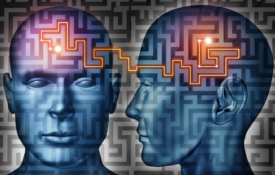-
Bias Is Built Into Our Brains. But There’s Still Hope.
Human beings are simplifiers. We are cognitive misers, exerting the least amount of mental effort that we can in making decisions. We rely on heuristics, or mental shortcuts, to take the fastest route from A to B. And we are categorizers. The tendency to conceive of the world around us in categories is a strategy that is often adaptive, but has at least one unfortunate byproduct: the bias that results from associations we make with different categories. And while there is no getting rid of bias, we can design systems to correct for these errors. ...
-
How Elvis Got Americans to Accept the Polio Vaccine
APS Member/Author: Hal Hershfield In late 1956, Elvis Presley was on the precipice of global stardom. “Heartbreak Hotel” had reached number one on the charts earlier that year and Love Me Tender, his debut film, would be released in November. In the midst of this trajectory, he was booked as a guest on the most popular TV show at the time, The Ed Sullivan Show. But he wasn’t only there to perform his hits. Before the show started, and in front of the press and Ed Sullivan himself, Presley flashed his swoon-worthy smile, rolled up his sleeves and let a New York state official stick a needle loaded up with the polio vaccine in his arm.
-

Cultural Conditioning in Progress: Children are More Likely to Prioritize the Needs of Animals
Beliefs about how animals should be treated vary significantly between cultures, and are likely socially acquired.
-
Even I Have to Admit That Being Positive is Good For Your Health
I have often admitted here that I’m a pessimist by nature, but even I have to agree that the health evidence in favour of taking a positive view of life is impressive. The most recent hopeful sign I’ve seen comes in the form of a study of almost 1,000 people in the US who underwent various psychological tests at the age of 55 and then at 64. The study, published in Psychological Science, found that the more people experienced positive emotions the less their memory was likely to have declined in the period. That’s a good incentive to make space for positive feelings and experiences, especially in an ageing society in which more people find their memory isn’t working as well as it used to.
-

Hypnotic Suggestions Can Make a Complex Task Easy by Helping Vision Fill in the Blanks
New research demonstrates that hypnosis can turn a normally difficult visual task into a far easier one.
-
Our Sense of Fairness Is Beyond Politics
APS Member/Author: Alison Gopnik What do the haves owe to the have-nots? Should a society redistribute resources from some people to others? These questions are central to the economic policy differences between left and right. The opposing views might seem completely irreconcilable. But a new paper in the journal Cognition suggests that people of all political stripes have surprisingly similar views about redistribution, at least in the abstract. Daniel Nettle at Newcastle University and Rebecca Saxe at MIT presented 2,400 people in the U.K. with stories about how an imaginary village could divvy up the food people grew in their gardens.

